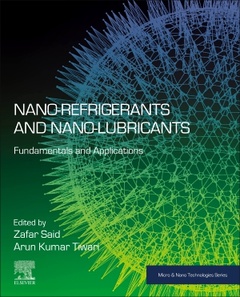Nano-refrigerants and Nano-lubricants Fundamentals and Applications Micro and Nano Technologies Series
Coordonnateurs : Said Zafar, Tiwari Arun Kumar

Nano-refrigerants and Nano-lubricants: Fundamentals and Applications provides an overview of nano-refrigerants and nano-lubricants, their synthesis, characterization, and influence of nanoparticles on the thermophysical properties. The book also describes the theoretical modeling and correlations using artificial intelligence, along with the effect of all these parameters on potential applications. Future challenges and research directions are thoroughly addressed by authors. Nano-refrigerants and Nano-lubricants are a novel class of nanofluids containing a mixture of nanoparticles, lubricant, and refrigerant, and because of their enhanced heat transfer properties, they have a broad potential range of residential and commercial applications.
2. Preparation and characterization of nanorefrigerants
3. Nanolubricant: synthesis, stabilization, and characterization techniques
4. Stability of nanorefrigerants and nanolubricants
5. Refrigeration systems using nanorefrigerants and nanolubricants
6. Thermophysical properties
7. Tribological properties of nanorefrigerants and nanolubricants
8. Rheological properties of the nanorefrigerants and nanolubricants
9. Coefficient of performance and energy performance analysis
10. Nucleate pool boiling of nanofluids with/without additives
11. Migration and degradation properties of nanoparticles in nanorefrigerants and nanolubricants
12. Theoretical analysis and correlations for predicting properties and evaluation methods for nanorefrigerants and nanolubricants
13. Soft computing tool (intelligent techniques) for nanorefrigerants and nanolubricants
14. Applications of nanorefrigerants and nanolubricants
15. Applications of nanotechnology
16. Challenges and difficulties in developing nanorefrigerants, nanolubricants, and way forward
Dr. Zafar Said is an Associate Professor with the Department of Sustainable Renewable Energy Engineering, University of Sharjah, UAE. He also serves as coordinator of the Functional Nanomaterials Synthesis Lab. Dr. Said completed his Ph.D. from the University of Malaya, Malaysia, and worked as a postdoctoral researcher at the Masdar Institute, UAE, where he has also worked on industrial collaborative projects. Dr. Said works on renewable energy, energy and exergy analysis, solar energy, heat transfer, and nanofluids. He has published over 180 papers, 2 books, 20 book chapters, and 26 conference papers, with more than 15,000 citations, and was also ranked in the World's Top 2% Scientists in 2022, 2021 and 2020 by Elsevier and Stanford University in the field of Energy. He is ranked in the top 100 scientists in the United Arab Emirates and has secured more than 2 million AED in research grants. He has been honoured with several prestigious awards and is also serving as Editorial Board Member for several ISI Journals, as well as Guest Editor for several special issues.
Dr. Arun Kumar Tiwari is as a Professor at the Mechanical Engineering Department, Institute of Engineering & Technology, Dr. A.P.J. Abdul Kalam Technical University, India. Dr. Tiwari completed his PhD in mechanical engineering from the Indian Institute of Technology and M. Tech in mechanical engineering from Indian Institute of Technology. His research interests include solar thermal energy, nanofluidics (characterization, application, and thermophysical & optical properties) and heat exchangers. He has published numerous articles on reputable journlas, such as Physics Report, Renewable and Sustainable Energy Reviews, Energy Conversion and Management and more.
- Summarizes preparation and characterization techniques for nano-refrigerants and nano-lubricants
- Examines a selection of nanoparticles based on variation in thermophysical properties and includes theoretical models and correlations for predicting their properties
- Features stability analysis of nano-refrigerants and nano-lubricants
Date de parution : 08-2024
Ouvrage de 310 p.
19x23.3 cm



